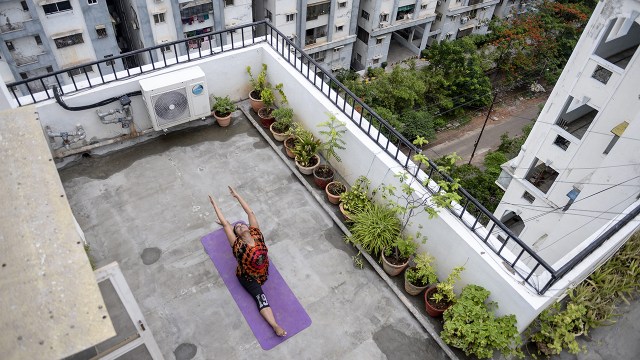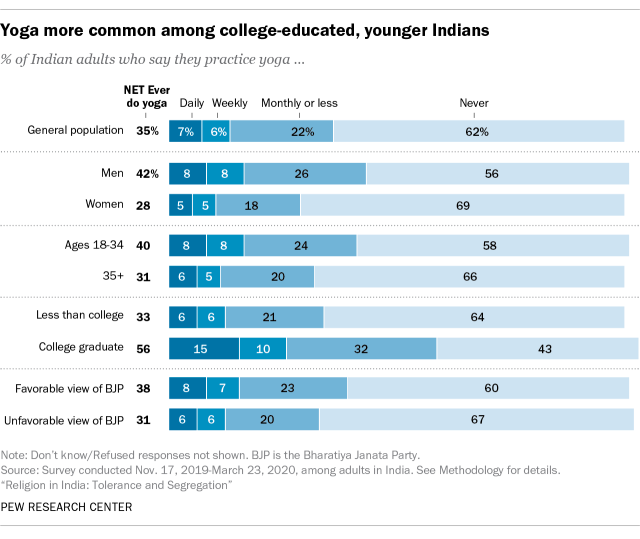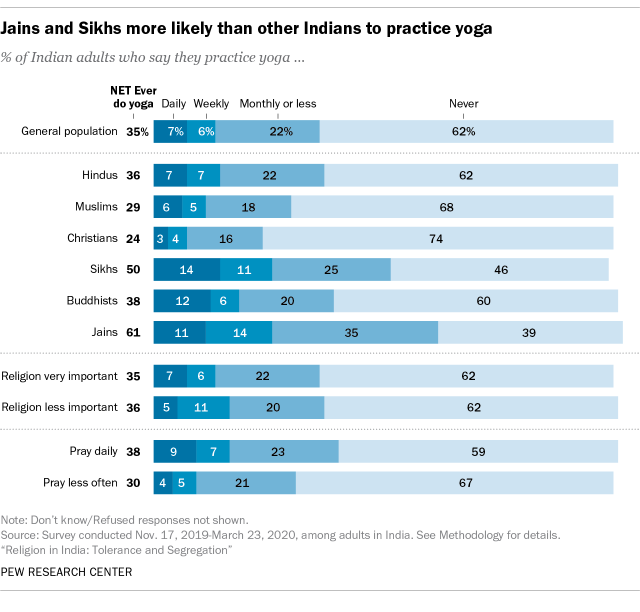
Yoga, which is mentioned in ancient, sacred scriptures of Hinduism, originated thousands of years ago in what is now India. The Indian government, under Prime Minister Narendra Modi, strongly encourages yoga as a cultural practice that promotes physical and spiritual health.
Still, a new Pew Research Center survey shows that most Indians do not practice yoga. Just about a third of Indian adults (35%) say they ever practice yoga, including 22% who say they do so monthly or less, and even fewer who do so daily (7%) or weekly (6%).
Pew Research Center conducted this analysis to better understand yoga’s prevalence in India, where the practice originated thousands of years ago. It is based on the 2021 report “Religion in India: Tolerance and Segregation,” Pew Research Center’s most comprehensive, in-depth exploration of Indian public opinion to date. For this report, we completed 29,999 face-to-face interviews, in 17 languages, with adults ages 18 and older living in 26 Indian states and three union territories. The sample includes interviews with 22,975 Hindus, 3,336 Muslims, 1,782 Sikhs, 1,011 Christians, 719 Buddhists and 109 Jains. An additional 67 respondents belong to other religions or are religiously unaffiliated. Interviews for this nationally representative survey were conducted from Nov. 17, 2019, to March 23, 2020.
Respondents were selected using a probability-based sample design that would allow for robust analysis of all major religious groups in India as well as all major regional zones. Six groups were targeted for oversampling as part of the survey design: Muslims, Christians, Sikhs, Buddhists, Jains and those living in the Northeast region. Data was weighted to account for the different probabilities of selection among respondents and to align with demographic benchmarks for the Indian adult population from the 2011 census.
Here are the questions used for this report, along with responses, and its methodology.
Roughly six-in-ten Indians (62%), including an identical share of Hindus, say they never practice yoga, according to the Center’s survey of 29,999 Indian adults conducted Nov. 17, 2019, to March 23, 2020.
Despite yoga’s roots in Hinduism, Hindus are not the religious group most likely to practice yoga in India. That distinction falls to Jains (61% of whom say they ever practice yoga), followed by Sikhs (50%). Indian Buddhists (38%) and Hindus (36%) are about equally likely to practice yoga, while fewer than one-third of Muslims (29%) and Christians (24%) in India do so; in all four of these religious groups, majorities say they never practice yoga.
Among Indians, the practice of yoga is much more widespread among college graduates than among those with less education (56% vs. 33%), and somewhat more common among men and younger adults than among women and older adults, respectively. There is also a modest political divide: 38% of Indians who say they have a favorable view of Modi’s Bharatiya Janata Party (BJP) say they practice yoga, compared with 31% of those who view the BJP unfavorably.
Yoga’s religious roots notwithstanding, Indians who say religion is very important in their lives are no more likely than other Indians to say they ever do yoga (35% vs. 36%). Indians who pray daily, however, are slightly more inclined than other Indians to say they do yoga (38% vs. 30%).
Yoga began spreading in the West over a century ago, and recent studies indicate it is practiced by many people in the United States and Europe. For example, the 2017 National Health Interview Survey found that 14% of U.S. adults had practiced yoga in the previous 12 months. (This question was worded differently than in the India survey, so the findings are not directly comparable.)
In Western Europe, Pew Research Center in 2017 asked adults if they “believe in yoga, not just as exercise, but as a spiritual practice.” The median share saying they believed this in the 15 countries surveyed was 26%, including roughly four-in-ten in Sweden (40%), Portugal (39%) and Finland (38%). College-educated Western Europeans were more likely than those with less education to say they believe in yoga as a spiritual practice, in a pattern that mirrors the findings in India – though the gaps in Europe were not as wide.
Note: Here are the questions used for this report, along with responses, and its methodology.


